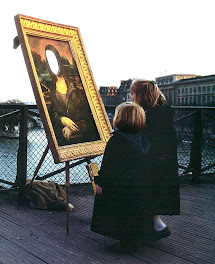Cuando las ideologías sin control, sean la iglesia católica en la Edad Media o el comunismo de Stalin, quieren crear el cielo en la tierra, casi siempre crean en su lugar el infierno. Pregunténle a las miles de "brujas y herejes" quemados y a los mile de campesinos e intelectuales que murieron en los Gulags en Siberia. Lo mismo le ha sucedido a la "revolución" cubana. El ideal de derrochar un dictador se ha convertido en su caricatura, en un pésimo humor negro. Hoy no es solo el segmento de una población la que es perseguida o encerrada: toda la población vive hoy en una prisión llamada Cuba y tiene un carcelero llamado Fidel Castro.
Erik Umansky, publica en la liberal revista en línea americana Slate, su reciente viaje a Cuba. Un fragmento:
"We move outside and Sanchez starts talking about Cuba itself. He shows me two maps, one of prisons in Cuba before the revolution and one now. The new map shows perhaps 10 times as many prisons. "We never used to be a country of crime," says Sanchez. "Now we have one of the largest incarceration rates in the world." Thousands—mostly suspected prostitutes, he says—are jailed under a law against "dangerousness," a vague Minority Report-type provision that essentially criminalizes intentions. Sanchez's work is well-regarded. But it's impossible to verify his numbers, since, as he points out, Cuba keeps its incarceration rates secret and prohibits inspections by human rights groups or the Red Cross—the only country in the Western hemisphere to do so. "Welcome to our gulag," Sanchez says, pointing to the map. As others have explained to me, it's not that there are thousands of political prisoners. It's that so much of regular life—from selling a car to owning a VCR—has been made illegal. So just about everybody breaks the law. They are pushed into doing so because of the absurdly low state salaries (about 260 pesos or $10 per month). Cubans get free monthly rations—in addition to free education and health care—but it's not enough, so just about everybody in one way or another works in the black market. (One example: When I was driving, I saw farmers offering peanuts along the side of the road. Then, at one point, they ran off into the bushes. Turns out a police car was driving by.)"
Vale la pena leer las cuatro páginas del texto. Sí, en Cuba Papá Castro les da a sus "ciudadanos" comida y cuidado médico "gratuitos", pero los ciudadanos reales no quieren nada gratis, lo que desean es la libertad para con su esfuerzo lograr sus sueños. Y eso es lo que Castro no está dispuesto a respetar, la libertad intrínseca de los hombres y mujeres de Cuba.
Suscribirse a:
Comentarios de la entrada (Atom)



1 comentario:
Parece ser naturaleza humana el cometer excesos deplorables cuando se detenta poder. Sumada a la intransigenica de Castro tenemos la de los EUA y su largo embargo criminal, y el gran perdedor de siempre es el pueblo llano, en este caso, el pueblo cubano. Es por eso que es tan importante para Mexico retomar su gran tradicion solidaria que poco a poco le roban personajes como Fox y Derbez.
Publicar un comentario